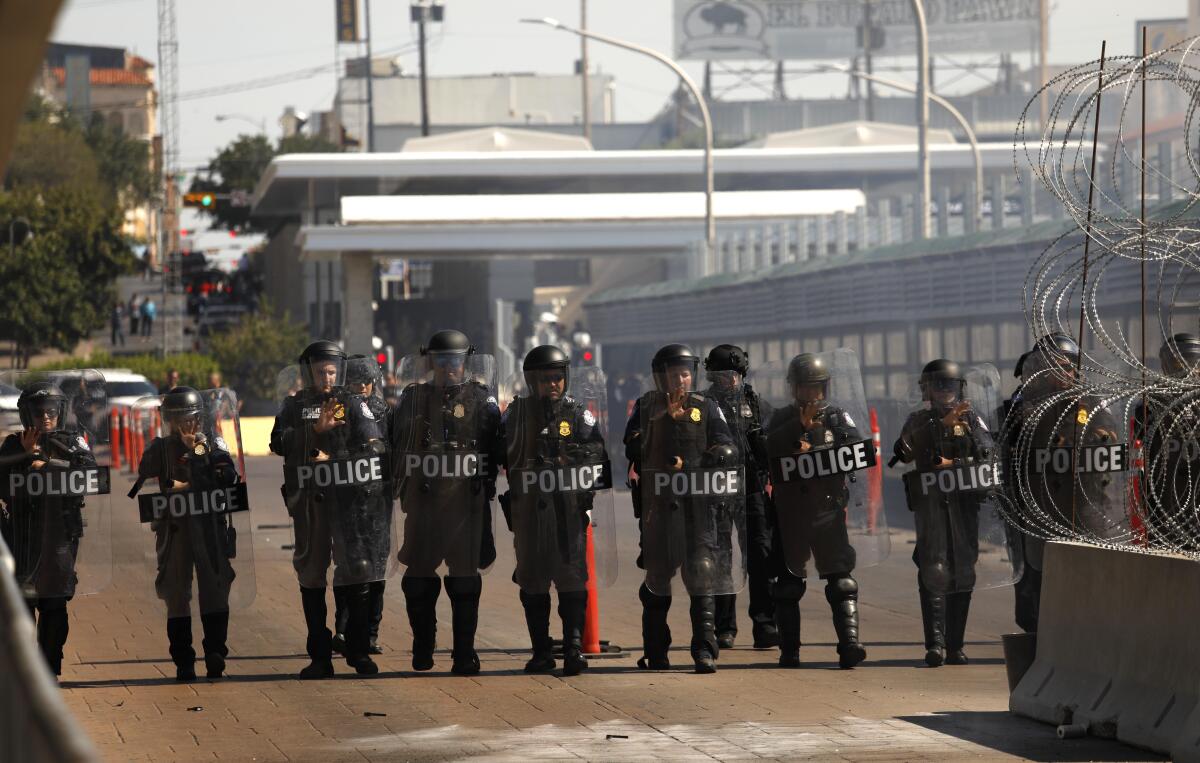Don’t blur the lines by calling Mexican drug cartels ‘terrorist organizations’

- Share via
In a scene from a 2018 movie “Sicario: Day of the Soldado,” a U.S. president decides to designate Mexican drug cartels as terrorist groups because it will provide new tools for U.S. national security to mitigate growing violence.
Designating violent Mexican drug cartels as foreign terrorist organizations is an alluring prospect for several reasons. The recent kidnapping and murder of two American citizens by the Gulf Cartel has once again made the issue prominent, including for policymakers and members of Congress.
Just as occurred in the film, there are high-ranking U.S. officials who believe that designating the cartels as terrorist groups will solve the twin national security crises of illegal immigration and drug trafficking. The most notable is former U.S. Atty. Gen. William P. Barr.
Yet, while designating the cartels as terrorist organizations has obvious emotional appeal, such an action is more likely to backfire than to stave off illegal immigration and drug trafficking fueled by instability emanating south of the U.S.-Mexico border.
Designating terrorist organizations is among the most powerful tools the United States wields to combat such groups. It provides the United States with the legal resources necessary to deny individuals within the group the ability to immigrate into the United States, blocks the groups’ access to the financial system, and makes it possible to prosecute individuals who provide material support. Some of these measures, such as denying the drug cartels access to the financial system, are already in place and are being weaponized against the most important Mexican drug trafficking groups.
We believe the terrorist designation would provide one significant source of leverage — expanding the range of individuals the U.S. government can prosecute for providing material support to any designated drug cartel. But on balance, this would be outweighed by a host of negatives.
To begin with, drug-related violence perpetrated by cartels is still inspired by underlying criminal motivations. In contrast to private military contractors like the Russian-backed Wagner Group, which we’ve both argued to designate as a terrorist organization, the Mexican cartels are criminally motivated. They make money and spend it only to further their criminal bottom line. Put simply, it’s profit, not politics. In contrast, organizations like Wagner are enmeshed in trying to alter the political status quo in Ukraine. This same dynamic is not in play in Mexico.
Next, designating drug cartels as terrorist organizations would dilute the list, conflating crime and terror. This inevitably leads to a slippery slope, especially when one considers the number of drug trafficking organizations that would qualify under similar criteria. Adding more terrorist groups to the list could outstrip the ability of the U.S. intelligence community to collect information on the most pressing foreign-based terrorist threats, Islamic State and Al Qaeda. Adding the cartels would mean reallocating resources away from those threats.
Another reason to eschew designating Mexican drug cartels is the need to avoid militarizing the border. This could significantly attenuate the flow of trade and economic activity, hurting both the U.S. and Mexico. That’s one reason Mexico has historically expressed concern about such a designation. When the Trump administration stated it was considering a similar action in 2019, Mexican President Andrés Manuel López Obrador was categorical in his staunch opposition. The terrorist designation would, by any standard, heighten U.S.-Mexico tensions, potentially setting back relations with an important country during a crucial time, given the ongoing border crisis.
Lastly, Mexican drug cartels are already deeply entrenched within the United States. Americans are operating on behalf of various cartels in myriad ways, from retail-level drug distribution to more complex logistical operation. If the U.S. takes the step to label Mexican drug cartels as terrorist groups, the potential militarization that comes with such a designation could have substantial spillover and second-order effects on how Americans could be prosecuted. Are teenage drug dealers and gang members in Chicago really on par with hardened Islamic State supporters plotting to attack U.S. citizens? We believe not, even though the scourge of fentanyl and other deadly drugs remains a serious challenge worthy of more resources and policy attention. It is different from terrorism.
At the end of “Sicario: Day of the Soldado,” the U.S. labeling of the drug cartels as terrorist groups backfired. Countering Mexican drug cartels is too important for the U.S. government to plagiarize a Hollywood script. Instead, policymakers should focus on the most effective way to counter the drug cartels’ ability to profit, particularly by focusing more on decreasing the demand for and supply of drugs in the U.S.
America’s insatiable craving for drugs is the problem. Let’s develop better domestic policies to treat addiction and give our medical, nonprofit and educational communities the tools they need to crush America’s crippling drug crisis, without confusing the Joaquín “El Chapo” Guzmáns of the world with the Osama bin Ladens.
Jason M. Blazakis, a professor of practice at the Middlebury Institute of International Studies, was director of the State Department’s Counterterrorism Finance and Designations Office in the Bureau of Counterterrorism from 2008 to 2018. Colin P. Clarke is the director of research at the Soufan Group and a senior research fellow at the Soufan Center.
More to Read
A cure for the common opinion
Get thought-provoking perspectives with our weekly newsletter.
You may occasionally receive promotional content from the Los Angeles Times.









